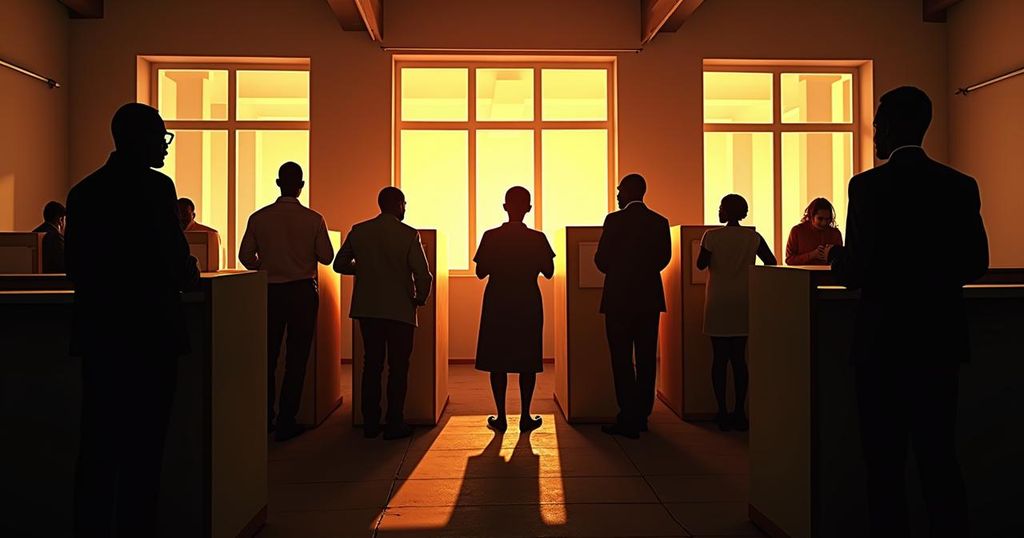Mozambique Votes: New Political Faces Promise to Tackle Armed Conflict

Mozambique’s election may result in the first president born post-independence, with 17 million voters eligible amid issues of corruption, armed conflict, and unemployment. Key candidates include Daniel Chapo of the ruling Frelimo party, Ossufo Momade of Renamo, independent Venancio Mondlane, and Lutero Simango of MDM. The election is a response to the demands for change from a younger electorate facing economic struggles and insecurity.
Mozambique is on the verge of electing a new president, potentially marking a historic shift in leadership as voters head to the polls in elections that may see the emergence of a candidate born after the country gained independence from Portuguese colonial rule in 1975. Approximately 17 million individuals out of a population of 32 million are eligible to participate in this electoral process, which encompasses both parliamentary and provincial elections across all 11 provinces. President Filipe Nyusi, aged 65, is stepping down after serving eight years in office, indicating a possible end to the era of leaders with ties to the liberation war. While Nyusi’s tenure has been marred by corruption scandals, particularly the ‘tuna bond’ scandal, the electoral campaign has been characterized by calls for change, particularly from the younger electorate, who are urging for improvements in job opportunities and security amidst ongoing poverty and armed conflicts. There are four primary candidates contesting for the presidency: 1. Daniel Chapo (47 years old) – As a recently appointed leader of the Frelimo party, Chapo has positioned himself as a proponent of peace and stability, intending to distance himself from the corruption associated with his party. He boasts incumbency advantages but faces skepticism from young voters regarding his party’s legacy. 2. Ossufo Momade (63 years old) – The leader of the opposition Renamo party, Momade retains significant support among his base, mostly due to his previous role in signing peace accords. However, his age and association with past conflicts place him at a disadvantage compared to younger candidates. 3. Venancio Mondlane (50 years old) – An independent candidate supported by a coalition of political parties, Mondlane has generated considerable enthusiasm among young voters, promoting job creation and healthcare improvements. However, concerns about potential violence following the elections remain. 4. Lutero Simango (64 years old) – The head of the third largest party, MDM, Simango emphasizes local job creation through resource management and processing. The electoral process also includes elections for 250 members of parliament and provincial officials. Key issues driving the election include the ongoing armed conflict in Cabo Delgado, economic challenges exacerbated by high unemployment rates, and the need for climate resilience following natural disasters. Amidst these pressing concerns, candidates have vowed to address the violence in Cabo Delgado, create job opportunities, and tackle food security issues stemming from climate-induced droughts. Vote counting will commence immediately following the polls’ closure, with partial results expected shortly thereafter. The National Election Commission will provide official results within 15 days, allowing contested parties to present grievances to the Constitutional Council, which will address any claims accordingly.
Mozambique’s elections, taking place amidst a backdrop of increasing insecurity and socioeconomic challenges, are critically poised to reshape the political landscape of the nation. This election cycle could mark the first ascendance of a younger president since independence, highlighting the generational shift in voter sentiment towards new leadership. The country has faced significant hurdles including rampant corruption, notably the ‘tuna bond’ scandal, and continuous armed conflict in the northern Cabo Delgado province, which has displaced over a million individuals. As the youth demographic constitutes a substantial portion of the electorate, their demands for employment and security are becoming increasingly prominent. The various candidates are attempting to respond to these contemporary issues in distinct ways, demonstrating divergent visions for the future of Mozambique.
The upcoming elections in Mozambique signify an important juncture in the nation’s political trajectory, with potential for significant change in leadership dynamics. As candidates rally support amid pressing issues such as armed conflict, economic instability, and climate resilience, the outcome will reflect the electorate’s aspirations and frustrations. With a young and increasingly vocal population, the elections present a critical opportunity to address longstanding challenges while potentially heralding a new chapter in Mozambique’s governance.
Original Source: www.aljazeera.com








